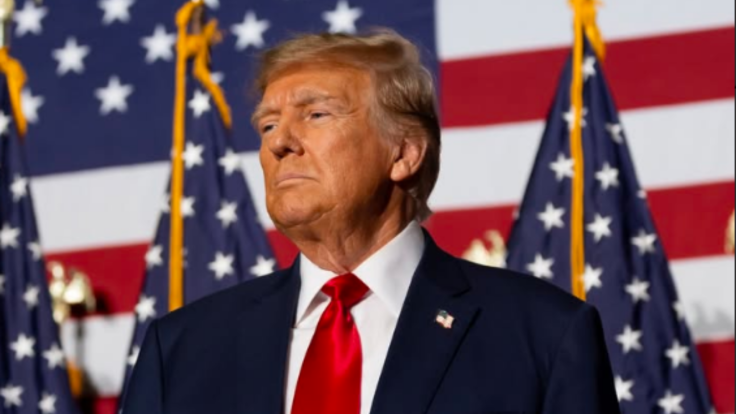Trump Seals Explosive Pfizer Deal To Cut Drug Prices With New TrumpRx Platform
Trump touts Pfizer deal to cut drug prices, sparking praise from supporters and questions from opponents.

President Donald Trump is preparing to unveil a sweeping agreement with pharmaceutical giant Pfizer that will lower the cost of prescription drugs across the United States.
The deal, expected to be announced on 30 September 2025, establishes a government-backed platform called TrumpRx, where discounted medicines will be sold directly to patients.
While Trump hails the move as a victory over Big Pharma, analysts warn the voluntary nature of Pfizer's pledges leaves enforcement uncertain.
Breaking Down The Pfizer–TrumpRx Agreement
The Trump administration has struck an agreement under which Pfizer will reduce the prices of several drugs in the United States and participate in a new government-run website called TrumpRx, designed to sell medicines directly to consumers.
The deal also includes a multibillion-dollar commitment to expand US research, development, and manufacturing, though reports stress that the pledges are voluntary, raising questions about enforcement.
The announcement is scheduled to follow Trump's July letters to pharmaceutical companies, demanding steep price cuts under a 'most-favoured nation' pricing principle. Covering the US pharmaceutical market, the initiative is expected to deliver discounted medicines through Medicaid and the nationwide TrumpRx platform. The arrangement, involving Donald Trump, Health Secretary Robert F. Kennedy Jr., and Pfizer, is being closely watched by industry executives, patient advocates, and lawmakers across the political spectrum.
President Trump: “Pfizer is committing to offer all of their prescription medications to Medicaid and it will be at the Most Favored Nation prices. It's going to have a huge impact on bringing Medicaid prices down.”
— AJ Huber (@Huberton) September 30, 2025
pic.twitter.com/lyayOB47a3
Inside the Deal: Price Cuts and Investments
Under the agreement, Pfizer will make selected drugs available at reduced prices via Medicaid and the TrumpRx platform. The initiative is designed to bypass traditional intermediaries such as pharmacy benefit managers, though the exact mechanics remain to be finalised. Pfizer also pledged billions toward domestic drug manufacturing and research and development (R&D) capacity.
This move builds on Trump's May 2025 executive order, which threatened regulatory action unless U.S. drug prices matched the lowest charged abroad. Analysts note that the deal represents the first significant test of whether voluntary compliance can deliver meaningful savings.
Markets reacted quickly, with Pfizer shares rising around 2% after the news broke. Wall Street analysts said investors welcomed the clarity on policy direction but cautioned that profit margins could tighten if similar agreements spread across the sector.
History of Clashes and Industry Pushback
Trump has clashed with the pharmaceutical industry before. During his first presidency, he floated a similar 'international reference pricing' plan in 2018, which drew heavy lobbying from drugmakers and was never fully implemented. By reviving the idea in 2025, Trump is seeking to claim a long-awaited victory on drug prices, one of his recurring campaign promises.
Pfizer, one of the world's largest drug companies, has often opposed sweeping government controls but appears to have calculated that cooperating could mitigate harsher regulation. Analysts suggest competitors like Merck, Johnson & Johnson, and Novartis may soon face comparable pressure to join TrumpRx or risk reputational damage.
Why This Matters for Patients and Politics
The deal is politically significant, giving Trump a tangible win on one of the most persistent voter concerns: high prescription costs. By launching TrumpRx, the administration is also signalling that it intends to reshape how patients access medicines, potentially reducing the influence of long-entrenched intermediaries.
Still, crucial questions remain. Will Pfizer extend price cuts to all private insurers, or only to Medicaid and TrumpRx? Will other firms join voluntarily, or wait for legal mandates? Consumer advocates are cautiously optimistic, urging that cuts be applied to costly treatments such as insulin and cancer drugs.
Industry groups warn that excessive pressure could undermine innovation, especially if revenue losses prompt companies to scale back their development of new therapies. Legal challenges are also possible, particularly from pharmacy benefit managers who stand to lose market share.
What Comes Next
Congress is expected to weigh in, with some lawmakers calling for the codification of elements of the deal into law. State regulators and insurers will also assess the impact on Medicare Part D and private plans.
For patients, the ultimate measure of success will be simple: whether the initiative translates into lower pharmacy bills or becomes another piece of political theatre.
© Copyright IBTimes 2025. All rights reserved.





















